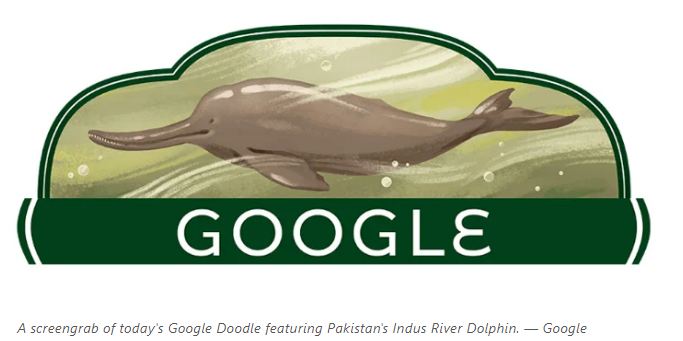ISLAMABAD, AUG 14: As the nation marks its 77th Independence Day today (Monday), global search engine Google has honoured Pakistan’s endemic Indus River dolphin, to celebrate the country’s achievement of self-determination and autonomy. On this day in 1947, Pakistan gained its independence and became a sovereign nation after almost 200 years of British occupancy.
The Google Doodle gave an account of the nation’s struggles for a free state in today’s doodle description on this historic day. “Following the Indian Independence Act in 1947, Muslim Indians wanted their own independent nation-state and started the Pakistan Movement. The movement was spearheaded by the All-India Muslim League, led by Muhammad Ali Jinnah,” it read. It is a national holiday on August 14 on account of Independence Day, and celebrations are made all across the country.
The day starts with a 31-gun salute in the federal capital and 21-gun salutes in all provincial capitals to tribute to the country. “Pakistani citizens throughout the country wave their national flag high in the sky and sing the national anthem. The main festivities occur in Islamabad, where the president and prime minister broadcast uplifting speeches about national heroes, recent achievements, and goals for the future.” Meanwhile, the main government buildings like the Parliament House, Supreme Court, President’s House, and more are decorated with bright lights and colors. Firework shows, rallies, and musical concerts are also part of the celebrations. Moreover, Google also described today’s doodle of the Indus River dolphin, which is the toothed whale species. “This endangered species, also known as the bhulan in Urdu and Sindhi, is a special sighting in coasts off Pakistan. Blind, with a snout equipped with two rows of sharp teeth, Pakistan’s rare dolphins — especially found in Sindh — are endangered and receive global importance due to their conservation status. It is one of the only four freshwater dolphin species in the world facing multiple threats, which include unsustainable fishing and entanglement incidents, canal stranding, and the release of untreated industrial effluents to the river among others. Living for millions of years in the turbid waters, the mammals eventually went blind and used echolocation, or a form of sonar, for navigation. There was once a time when a large number of blind dolphins would be found in the Indus River. But now, its habitat has shrunk due to the construction of reservoirs, dams, and barrages for agricultural purposes.

















